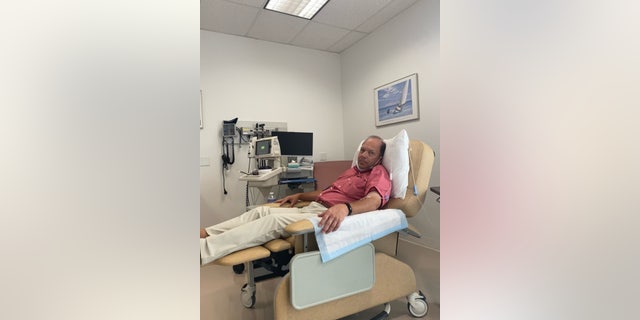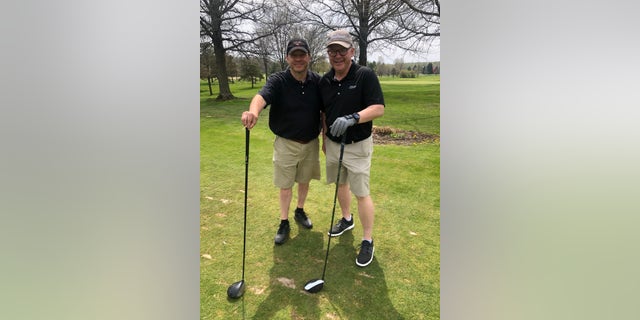The first new Alzheimer’s treatment in 20 years was given full FDA approval earlier this month — and now two patients who participated in the clinical trials have spoken about their personal experience with the drug to Fox News Digital.
Lecanemab, sold under the brand name Leqembi, works by reducing amyloid plaques in the brain, which is one of the hallmarks of Alzheimer’s.
In early trials, the drug was shown to slow cognitive decline by 27%.
FDA FULLY APPROVES ‘NOVEL’ ALZHEIMER’S DISEASE DRUG LEQEMBI, WILL BE COVERED BY MEDICARE
Two Ohio patients who participated in the trials recently spoke to Fox News Digital about how Leqembi has impacted their Alzheimer’s journeys — and changed their lives.
Joan Murtaugh’s story: ‘It’s not a miracle, but it’s gradual progress’
Joan Murtaugh, 77, lives in Lakewood, Ohio, with her husband, Larry.
She first started noticing memory problems nearly seven years ago, just after her 70th birthday.
“Timing is everything,” her husband, Larry Murtaugh, told Fox News Digital in an interview. “It was Joan who made an appointment at the brain center clinic.”
In 2017, Murtaugh was diagnosed with mild cognitive impairment.
The next year, after having a 3-D MRI and spinal tap, she learned that she had an enzyme in her spinal fluid that predicted a 65% chance of getting Alzheimer’s in her lifetime.

Two Ohio patients who participated in the trials spoke to Fox News Digital about how Leqembi has impacted their Alzheimer’s journeys. On the left, patient Joan Murtaugh is pictured with husband Larry Murtaugh; on the right, patient John Domeck is shown with wife Ann Domeck. (Joan & Larry Murtaugh/John & Ann Domeck)
In February 2020, Murtaugh received some good news: She was eligible to participate in a double-blind study trial for a new drug, Leqembi, at Cleveland Clinic in Ohio.
“I assume it was because it was obvious there was some plaque in my brain, which they realized was causing Alzheimer’s,” Murtaugh told Fox News Digital.
This was Phase 3 of the clinical trial, which included some 1,800 people worldwide. Murtaugh was one of only eight people to receive the drug at Cleveland Clinic.
“I am fully functional — I’m still doing everything I always did.”
A few months later, she began getting twice-monthly infusions of what was either a drug or a placebo.
ALZHEIMER’S DISEASE IS MOST COMMON IN THESE US COUNTIES, NEW STUDY FINDS
To this day, Murtaugh still doesn’t know if she was getting the real thing or a placebo — she won’t find out until the very last person has received the very last dose of the double-blind study. Yet she said she “has a hunch.”
“I am fully functional — I’m still doing everything I always did,” Murtaugh said.
“I can still drive my car, shop, garden, cook, read — all those things.”

“Timing is everything,” husband Larry Murtaugh told Fox News Digital in an interview about the Alzheimer’s diagnosis of his wife, Joan Murtaugh. (Joan & Larry Murtaugh)
Throughout the entire trial period, Murtaugh said she never got any worse. She just experienced the same mild symptoms she’d had before starting the drug — and she may have even improved a bit.
Although Leqembi has been linked to some potential side effects, she experienced none.
“When you first hear the word ‘Alzheimer’s,’ a chill goes through you — it’s like you’re looking into a dark abyss,” Murtaugh said.
“But this new drug offers great hope.”
VISION PROBLEMS COULD MEAN HIGHER DEMENTIA RISK, STUDY FINDS: ‘EYE HEALTH AND BRAIN HEALTH ARE CLOSELY LINKED’
In September 2021, the trial portion of the study ended and Murtaugh was eligible to start receiving the actual medication, which she still takes today.
Instead of the lengthy infusions, she now gets the medication via an EpiPen injection once a week with the help of her husband.
The drug is currently covered by Medicare, which means Murtaugh gets it for free — and she hopes that will continue for the foreseeable future.
While the Murtaughs realize that the future may bring challenges, they regard Leqembi as “a ray of sunshine in a very cloudy sky.”

Throughout the entire trial period, Joan Murtaugh, shown here, said she never got any worse; she said she just experienced the same mild symptoms she’d had before starting the drug. (Joan Murtaugh)
Paired with other approaches such as cognitive speech therapy, they’re optimistic that the drug will continue to keep Alzheimer’s symptoms at bay.
“We’re not going to declare victory, but we’re on the right path and we have the right team at Cleveland Clinic,” said Larry Murtaugh.
“It’s not a miracle, but it’s gradual progress.”
John Domeck’s story: ‘I thank God every day’
A retired attorney in Aurora, Ohio, John Domeck was just 57 years old when he was diagnosed with Alzheimer’s.
The people around him — his colleagues at the law office and his family at home — started noticing his memory lapses before he did.
After 30 years of never having to take many notes at work, Domeck, now 61, had started to write things down to avoid forgetting them.
“Alzheimer’s kind of rocked our world, and this drug rocked it back a little bit the other way.”
“Over time, I wasn’t able to continue doing as much work as quickly as I once did,” he told Fox News Digital during an interview.
His wife of 40 years, Ann Domeck, had also started noticing some red flags at home, but said the last thing they expected was Alzheimer’s disease.
The Domecks made an appointment at Cleveland Clinic for some cognitive testing, which led to a spinal tap and, ultimately, an Alzheimer’s diagnosis in July 2019.

John Domeck, a retired attorney in Aurora, Ohio (second from left), was just 57 when he was diagnosed with Alzheimer’s. He’s pictured here with his family. (John & Ann Domeck)
Domeck’s wife, a TV news producer in Cleveland, left her job to help care for her husband.
Given Domeck’s young age and early-stage decline, a Cleveland Clinic doctor told him he was the perfect candidate for a clinical trial for a new Alzheimer’s drug.
For 18 months, Domeck went in for twice-monthly infusions, which lasted up to six hours per session — without knowing whether he was getting the drug or the placebo.
A year ago, he was switched to the “open-label” Leqembi medication, which he takes via injection at home once a week.
SURPRISING BRAIN BOOST: BRUSHING YOUR TEETH MAY REDUCE THE RISK OF DEMENTIA, NEW STUDY SUGGESTS
The Domecks suspect that John has been on the drug the entire time, as he has not declined much at all in the past four years.
“Everyone’s like, he had to have been getting it before — he’s doing so well,” Ann Domeck said. “His cognitive deficits have only increased minimally. After four years of Alzheimer’s, his scores should be a lot lower.”
“The fact that he’s still able to maintain his day-to-day activities and do the things that he enjoys is just so promising,” she added.

John Domeck is pictured here getting an infusion of either the Alzheimer’s drug or the placebo during the clinical trial. (John Domeck)
“John gets up and drives and golfs and reads every day,” she said. “He got to see our son get married, and we’re planning to visit our daughter in Europe.”
Throughout the process, the Domecks said they have been “astounded” by the compassion and support of their care team at Cleveland Clinic.
“They’re professionals, and they know their stuff about Alzheimer’s, but they’re also some of the nicest people we’ve ever met,” Ann Domeck said.
While the couple understand that Leqembi is not a cure, they’re more optimistic now than they were a few years ago.
“Taking this drug is a long-term commitment.”
“Alzheimer’s kind of rocked our world, and this drug kind of rocked it back a little bit the other way,” said Ann Domeck.
After initially being “shell-shocked” by the unexpected diagnosis, the Domecks feel that the drug has given them time they were told not to expect.
“I thank God every day that we got in this trial,” Ann Domeck said. “It’s the best thing that’s happened to us.”
What to know about Leqembi
While it’s the first Alzheimer’s drug to receive full FDA approval in 20 years, Leqembi is also the first medication to target the underlying disease and not just the symptoms, explained Dylan Wint, M.D., director of the Cleveland Clinic Lou Ruvo Center for Brain Health in Las Vegas, Nevada.
Leqembi is approved only for the treatment of mild cognitive impairment or early-stage Alzheimer’s for people who have been shown to have amyloid plaques in the brain.

John Domeck (far right) is pictured with his family at his daughter’s college graduation. Throughout the whole process, the Domecks said they have been “astounded” by the compassion and support of their care team at Cleveland Clinic. (John & Ann Domeck)
“Lecanemab labels abnormal amyloid and tells the immune cells to remove those fibers from the brain,” Wint told Fox News Digital.
In testing, about two-thirds of patients went from amyloid positive to amyloid negative — and cognitive and functional decline was 27% slower for study participants compared to those on placebo, the doctor said.
AI GIVES DOCTORS PERSONALIZED TREATMENT PLANS FOR DEMENTIA PATIENTS
“Taking this drug is a long-term commitment,” said Wint. “Doctors need to make sure the patient can tolerate this rigorous regimen — intravenous infusions every two weeks for 18 months, interspersed with MRI scans and memory testing.”
More care and support are needed for people with moderate and severe Alzheimer’s disease and their families, not to mention people with other forms of dementia, he added.

The new Alzheimer’s drug has enabled John Domeck (above left) to continue to participate in the activities he enjoys. (John Domeck)
As with any medication, lecanemab can have some side effects.
Most commonly, it can cause various brain reactions, like swelling and bleeding, explained Manisha Parulekar, M.D., co-director of Hackensack University Medical Center’s Center for Memory Loss & Brain Health in New Jersey.
“Patients will have to stop the medication if these changes are noted on MRIs,” Parulekar told Fox News Digital. “People who are taking multiple blood thinners will not be able to take Leqembi.”
Headaches and confusion are also commonly reported.
CLICK HERE TO SIGN UP FOR OUR HEALTH NEWSLETTER
Now that Leqembi is fully approved, Medicare will cover the medication, with other insurance companies likely to follow, said Parulekar.
“Without Medicare or insurance, the out-of-pocket costs are around $26,000 per year,” she noted.
Alzheimer’s disease involves many complex factors, Wint noted, and the new medication targets just one factor: amyloid.
“While this new approach is excellent news, removing amyloid is not a cure,” he said.
“We still need to find better symptomatic and disease-modifying treatments in the future.”
Leqembi is most effective when combined with existing treatments, said Wint, including symptomatic medicines, rehabilitation and family support.
Read More: World News | Entertainment News | Celeb News
